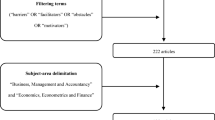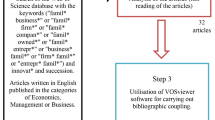Abstract
The argument in this article is that knowledge is an important phenomenon to understand in order to discuss development and innovation in modern workplaces. Predominant theories on knowledge in organisation and innovation literature, we argue, are based on a dualist concept of knowledge. The arguments found in these theories argue for one type of knowledge in contrast to another. The most prevailing dualism is that between local and universal knowledge. We believe that arguing along this line does not bring us further in order to understand what knowledge is and what it does. We argue that there are contradictory arguments in the dualist conception of knowledge. We discuss how to move beyond this. We present a framework for discussing what knowledge is. We discuss what type of meta perspective will allow us to compare different knowledge kinds. We argue that insight into this has implications for understanding knowledge generation and innovation.
Similar content being viewed by others
References
Amin A, Partrick C (2004) Architectures of knowledge: firms, capabilities, and communities. Oxford University Press, Oxford
Arbnor I, Bjerke B (1997) Methodology for creating business knowledge. Sage Publications, Thousand Oaks
Argyris C, Robert P, Diana S (1985) Action science: concepts, methods, and skills for research and intervention. Jossey-Bass Inc. Publishers, San Francisco
Arnold E, Muscio A, Nählinder J, Reid A (2005) Mid-term evaluation of the Vs2010 Programme: a report to the research council of Norway Technopolis
Burrell G, Morgan G (1979) Sociological paradigms and organisational analysis. Gower Publishing Company, Aldershot
Cooke P (2002) Knowledge economies: clusters, learning and cooperative advantage. Routledge, London
De Greé G (1943) Society and ideology. Colombia University Bookstore, New York
Deetz S (1996) Describing differences in approaches to organization science: rethinking burell and morgan and their legacy. Organization Science, vol. 7, No. 2
Elden M, Levin M (1991) Cogenerative learning—bringing participation into Action research. In: Whyte WF (ed) Participatory Action Research. SAGE publications, Newbury Park
Foucault M (1973) Power. In: Faubion JD (ed) 2001: The essential works of Michel Foucault, 1954–1984. Vol. 3
Geertz C (1983) Local Knowledge. Basic Books, New York
Greenwood DJ, Levin M (1998) Introduction to Action Research: social research for social change. Sage Publications, Thousand Oaks
Greenwood DJ (2002) Action research: unfulfilled promises and unmet challenges. In: Concepts and transformation 7:7, pp 117–139
Gustavsen B, Colbjørnsen T, Pålshaugen Ø (1998) Development coalitions in working life: The “Enterprise Development 2000” Program in Norway. John Benjamins Publishing Co., Amsterdam
Gustavsen B, Finne H, Oscarsson B (2001) Creating connectedness: the role of social research in innovation policy. John Benjamins Publ. Co., Amsterdam
Gustavsen B (2004) Making knowledge actionable: from theoretical centralism to distributive constructivism. Concepts and transformation 9:2, John Benjamins Publishing Company, pp 147–180
Habermas J (1974/1964) Theory and Practice. Heinemann, London
Habermas J (1997/1981) Theori des Kommunikativen English translation by Thomas McCarthy: The Theory of Communicative Action: Reason and the Realization of Society, vol 1. Polity Press, London
Habermas J 2001 (1984) On the pragmatics of social interaction. The MIT Press, Cambridge
Habermas J (2003) Truth and justification. The MIT Press, Cambridge
Johnsen HCG (2002) Discourse and change in organisations. Concepts and Transformation 7(3):301–321
Johnsen HCG (2005) Action research—a not so dangerous liaison with conventional research. AI & Soc 19(4)
Knorr Cetina K (1999) Epistemic cultures: how the sciences make knowledge. Harvard University Press, Cambridge
Kuhn T (1962) The structure of scientific revolutions. Chicago University Press, Chicago
Levin M (ed) (2002) Researching enterprise development. Action research on the co-operation between management and labor in Norway. John Benjamins Publishing Company, Amsterdam
Lundvall B-Å (2002) Innovation, growth and social cohesion: the Danish model. Edward Elgar, Cheltenham
Lyotard J-F (1979) The postmodern condition: a report on knowledge. University of Minneapolis Press, Minneapolis
Mannheim K (1936) Ideology and utopia. Routledge & Kegan Paul, London
McKelvey B (2002) Postmodernism vs. truth in management theory. In: Ed Locke (ed) Modernism and management: Pros, Cons, and Alternatives. Elsevier, Amsterdam
Merton RK (1973) The Sociology of Science. University of Chicago Press, Chicago
Mintzberg A, Lampel (1998) Strategy Safari. The Free Press, New York
Nonaka I, Hirotaka T (1995) The knowledge creating company: how japanese companies create the dynamics of innovation? Oxford University Press, New York
Nowotny H, Scott P, Gibbons M (2001) Rethinking science: knowledge production and the public in an age of uncertainty. Polity Press, Oxford
Pålshaugen Ø (2002) Discourse democracy at work: on public spheres in private enterprises. In: Concepts and Transformation 7:1
Polanyi M (1966) The tacit dimension. Doubleday, New York
Putnam H (2004) Ethics without ontology. Harvard University Press, Cambridge
Reason P, Bradbury H (eds) (2001) Handbook of Action Research. Sage Publishing, Thousand Oaks
Rodrigues MJ (2002) The new knowledge economy in Europe: a strategy for international competitiveness and social cohesion. Edward Elgar, Cheltenham
Rorty R (2000) Universality and truth. In: Robert Brandon (ed) Rorty and his critics. Blackwell, Oxford
Ryle G (1949) The concept of mind. The Chicago University of Chicago Press, Chicago
Sayer A (1984) Method in social science—a realist approach. Routledge, London
Spender JC (1997) Making knowledge the basis of a dynamic theory of the firm. Strateg Manage J 17:45–62
Toulmin S, Gustavsen B (eds) (1996) Beyond theory: changing organizations through participation. John Benjamins Publishing Company, Amsterdam
Tsoukas H (2005) Complex knowledge: studies in organizational epistemology. Oxford University Press, Oxford
Author information
Authors and Affiliations
Corresponding author
Additional information
An earlier version of this article has been presented as a paper at: 21st EGOS Collegium, June 30 to July 2, 2005, Berlin, Germany. Sub-theme 18: When Organization Studies Meet Economics: Alternative Philosophies of Knowledge Management and the Theory of the Firm. And a revised version was presented at the workshop: The Knowledge Economy: new directions in work organisation and regional innovation, Kingston University, London, September 1, 2006.
Rights and permissions
About this article
Cite this article
Johnsen, H.C.G., Karlsen, J., Normann, R. et al. The contradictory nature of knowledge: a challenge for understanding innovation in a local context and workplace development and for doing action research. AI & Soc 23, 85–98 (2009). https://doi.org/10.1007/s00146-007-0159-5
Received:
Accepted:
Published:
Issue Date:
DOI: https://doi.org/10.1007/s00146-007-0159-5




